Meet Your Military
- Details
- Hits: 3340
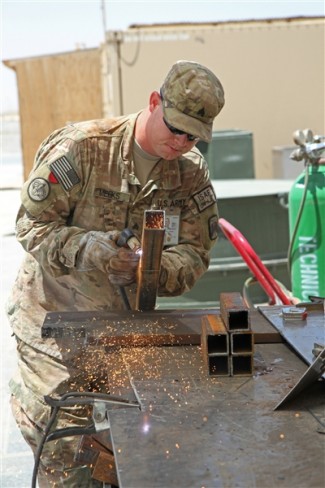 PHOTO: Army Sgt. Marshall R. Meeks prepares pieces he will use to make a cart to transport heavy equipment at Kandahar Airfield, Afghanistan, June 7, 2014. U.S. Army photo by Staff Sgt. Bryan Lewis KANDAHAR AIRFIELD, Afghanistan – An allied trade specialist with Task Force Bellator here uses his creativity not only to enhance his unit’s mission effectiveness, but also to raise his morale. Army Sgt. Marshall R. Meeks enlisted as a metal worker in 2006. As the Army transitioned, his military occupational specialty was combined with the machinist specialty to produce more versatile soldiers. Meeks, a San Antonio native, said he enlisted as a way to expand on abilities he had developed in his civilian life. “I used to be a mechanic, [used to] build houses, and was a freelance contractor,” he said. “I joined the Army to be a welder.” Now serving on his third deployment, Meeks transitioned from supporting ground units most of his career to supporting aviation with the 16th Combat Aviation Brigade.
PHOTO: Army Sgt. Marshall R. Meeks prepares pieces he will use to make a cart to transport heavy equipment at Kandahar Airfield, Afghanistan, June 7, 2014. U.S. Army photo by Staff Sgt. Bryan Lewis KANDAHAR AIRFIELD, Afghanistan – An allied trade specialist with Task Force Bellator here uses his creativity not only to enhance his unit’s mission effectiveness, but also to raise his morale. Army Sgt. Marshall R. Meeks enlisted as a metal worker in 2006. As the Army transitioned, his military occupational specialty was combined with the machinist specialty to produce more versatile soldiers. Meeks, a San Antonio native, said he enlisted as a way to expand on abilities he had developed in his civilian life. “I used to be a mechanic, [used to] build houses, and was a freelance contractor,” he said. “I joined the Army to be a welder.” Now serving on his third deployment, Meeks transitioned from supporting ground units most of his career to supporting aviation with the 16th Combat Aviation Brigade.
His ability to weld, mold and create products from scratch makes him a highly sought commodity among the unit’s logisticians, mechanics, crew chiefs, pilots and senior leaders. “Being in a welding shop is a real spotlight,” he said. “A lot of people get you to build a lot of different stuff. They will give me a blueprint with tolerances. … As long as you make it to that print, then you are good to go.” Meeks assisted soldiers in his support battalion by building a cart to carry Hellfire missiles and their cases, which weigh almost 250 pounds each. Moving each case used to require four soldiers carrying it, but now the task requires just one soldier rolling a cart. Meeks said that on a previous deployment, he was shown a picture of a missile cart, but it carried only the missile and not the case.
Read more: Meet Your Military: Soldier's Creativity Benefits Mission, Morale
- Details
- Hits: 2500
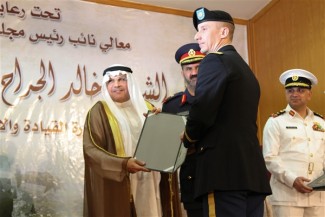 PHOTO: U.S. Army Maj. Robert Bonham receives his master's degree in military science from Kuwaiti Deputy Prime Minister Sheikh Salem Abdulaziz Al-Sabah after completing the advance staff college course at the Mubarak Al-Abdullah Joint Command and Staff College in Kuwait City, June 17, 2014. U.S. Army photo by Sgt. Tracy R. Myers KUWAIT CITY – Among a crowd of foreign military personnel wearing a multitude of different hats and uniforms, one U.S. Army officer, Maj. Robert Bonham, graduated from the Mubarak Al-Abdullah Joint Command and Staff College here yesterday. Bonham, a native of Shalersville, Ohio, participated in the U.S. Army’s Schools of Other Nations program to further his career. As a graduate of the Mubarak Al-Abdullah Joint Command and Staff College, he has earned a master’s degree in military science.
PHOTO: U.S. Army Maj. Robert Bonham receives his master's degree in military science from Kuwaiti Deputy Prime Minister Sheikh Salem Abdulaziz Al-Sabah after completing the advance staff college course at the Mubarak Al-Abdullah Joint Command and Staff College in Kuwait City, June 17, 2014. U.S. Army photo by Sgt. Tracy R. Myers KUWAIT CITY – Among a crowd of foreign military personnel wearing a multitude of different hats and uniforms, one U.S. Army officer, Maj. Robert Bonham, graduated from the Mubarak Al-Abdullah Joint Command and Staff College here yesterday. Bonham, a native of Shalersville, Ohio, participated in the U.S. Army’s Schools of Other Nations program to further his career. As a graduate of the Mubarak Al-Abdullah Joint Command and Staff College, he has earned a master’s degree in military science.
The Schools of Other Nations program aims to develop closer relationships between the U.S. and foreign armies. Bonham said he is grateful for the knowledge and kinship he took away from his educational experience. “Having the chance to attend the Kuwait army staff college through the Schools of Other Nations [program] was a rewarding experience personally and professionally,” he said. “I’ve developed lasting relationships with officers from across the globe. I have learned a great deal about how their militaries function and integrate nationally as members of the Gulf Cooperation Council and International Coalition.” The Gulf Cooperation Council, a political and economic alliance of six Middle Eastern countries -- Saudi Arabia, Kuwait, the United Arab Emirates, Qatar, Bahrain and Oman -- was established in 1981 to achieve unity among its members based on their common objectives and their similar political and cultural identities. “The most unique facet of the course was the joint, multinational aspect,” Bonham said. “The majority of students were Kuwait officers from the Kuwait armed forces and Ministry of Interior, while the remaining students were from all military branches of Pakistan, Turkey, Bangladesh, United Kingdom, Canada, Australia, Jordan, Lebanon, Sudan and GCC countries.” The 10-month graduate-level course trains field-grade officers to perform as a member of a joint, multinational headquarters. U.S. Army majors are required to complete intermediate level education as part of their professional military education, Bonham noted.
Read more: Meet Your Military: U.S. Major Graduates From Kuwaiti Course
- Details
- Hits: 3594
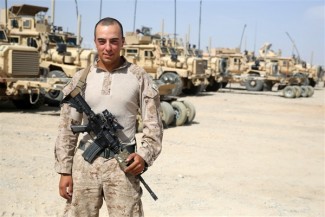 PHOTO: Marine Corps Cpl. Jonathan Hollis, an anti-tank missileman with Weapons Company, 1st Battalion, 7th Marine Regiment, earned a combat meritorious promotion to corporal, June 2, 2014, during his deployment to Afghanistan’s Helmand province. U.S. Marine Corps photo by Cpl. Joseph Scanlan CAMP LEATHERNECK, Afghanistan– Many young adults in the United States pursue college directly after graduating high school. While some continue to pursue a degree, others decide along the way to pursue a different path. Marine Corps Cpl. Jonathan Hollis attended college immediately after high school, but after a few short years of enduring the monotonous routine, he said, he was fed up and sought an adventure. He’s now deployed here as an antitank missileman with Weapons Company, 1st Battalion, 7th Marine Regiment. Hollis and his eight siblings were raised in Grand Rapids, Michigan. He was home-schooled until he was a teenager, and then he attended Caledonia High School. “Because I was home-schooled, it was pretty strict at home, so when I got to public school, I never missed a homework assignment,” he said. His high school grades earned him an engineering scholarship, and when he graduated, he went on to Grand Rapids Community College. He continued to earn good grades and made the dean’s list during his first year, he said, but he wasn’t content.
PHOTO: Marine Corps Cpl. Jonathan Hollis, an anti-tank missileman with Weapons Company, 1st Battalion, 7th Marine Regiment, earned a combat meritorious promotion to corporal, June 2, 2014, during his deployment to Afghanistan’s Helmand province. U.S. Marine Corps photo by Cpl. Joseph Scanlan CAMP LEATHERNECK, Afghanistan– Many young adults in the United States pursue college directly after graduating high school. While some continue to pursue a degree, others decide along the way to pursue a different path. Marine Corps Cpl. Jonathan Hollis attended college immediately after high school, but after a few short years of enduring the monotonous routine, he said, he was fed up and sought an adventure. He’s now deployed here as an antitank missileman with Weapons Company, 1st Battalion, 7th Marine Regiment. Hollis and his eight siblings were raised in Grand Rapids, Michigan. He was home-schooled until he was a teenager, and then he attended Caledonia High School. “Because I was home-schooled, it was pretty strict at home, so when I got to public school, I never missed a homework assignment,” he said. His high school grades earned him an engineering scholarship, and when he graduated, he went on to Grand Rapids Community College. He continued to earn good grades and made the dean’s list during his first year, he said, but he wasn’t content.
“I hated college,” Hollis said. “I didn’t like sitting in a room for hours upon hours every day, just repeating the same schedule. I would show up in the morning, do my classes and leave at night while having a job on the side. It was just the same thing every day, and I was sick of it.” While Hollis was a student, two of his brothers who were infantrymen in the Marine Corps told him about their experiences, and that’s when he decided to become a Marine himself. He enlisted as an infantryman and departed for recruit training Dec. 10, 2012.
Read more: Meet Your Military: Student Follows Brothers Into Marine Corps
- Details
- Hits: 4252
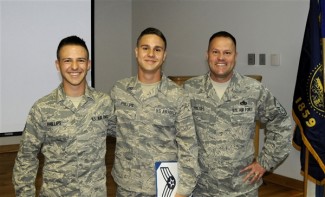 PHOTO: Air Force Senior Airman Zachary Phillips, center, is promoted to his present rank June 7, 2014, at a ceremony on the Portland Air National Guard Base, Ore. His brother, Air Force Senior Airman Lewis Phillips, left, and their father, Air Force Senior Master Sgt. John Phillips participated in the ceremony. U.S. Air Force photo by Staff Sgt. Brandon Boyd PORTLAND AIR NATIONAL GUARD BASE, Ore. – He speaks quickly, with a certain believability and earnestness about him, and he sports a fresh, short haircut not two days old.Perhaps that’s because he’s trying to set an example. As a first sergeant in the Oregon Air National Guard, Air Force Senior Master Sgt. John Phillips reports directly to the 142nd Fighter Wing commander on matters of enlisted morale, welfare, and conduct. As a father, he reports to two sons, Lewis and Zach, both of whom dreamed of joining the military ever since they toured the Portland Air National Guard base as small children, coming to see their dad’s unique office. “They’d come out here to the base for family day [or] Christmas parties. It was always an exciting place for them to visit,” he said. Phillips' sons said they remember the awe and excitement they felt seeing and hearing the jets take off as they traveled from rural Roseburg, Oregon, to visit their dad at his unique workplace. "My first memory was my dad introducing us to his co-workers in maintenance.
PHOTO: Air Force Senior Airman Zachary Phillips, center, is promoted to his present rank June 7, 2014, at a ceremony on the Portland Air National Guard Base, Ore. His brother, Air Force Senior Airman Lewis Phillips, left, and their father, Air Force Senior Master Sgt. John Phillips participated in the ceremony. U.S. Air Force photo by Staff Sgt. Brandon Boyd PORTLAND AIR NATIONAL GUARD BASE, Ore. – He speaks quickly, with a certain believability and earnestness about him, and he sports a fresh, short haircut not two days old.Perhaps that’s because he’s trying to set an example. As a first sergeant in the Oregon Air National Guard, Air Force Senior Master Sgt. John Phillips reports directly to the 142nd Fighter Wing commander on matters of enlisted morale, welfare, and conduct. As a father, he reports to two sons, Lewis and Zach, both of whom dreamed of joining the military ever since they toured the Portland Air National Guard base as small children, coming to see their dad’s unique office. “They’d come out here to the base for family day [or] Christmas parties. It was always an exciting place for them to visit,” he said. Phillips' sons said they remember the awe and excitement they felt seeing and hearing the jets take off as they traveled from rural Roseburg, Oregon, to visit their dad at his unique workplace. "My first memory was my dad introducing us to his co-workers in maintenance.
We got to try on night-vision goggles and flight suits, and he took us around to see the different shops on base,” said Air Force Senior Airman Lewis Phillips, the elder of the brothers who followed their father into the Oregon Air National Guard and the 142nd Fighter Wing. They now work just a few steps away from one another. Lewis Phillips said he was inspired by his father and decided to join the military during his junior year of high school, but he wanted to follow a career path that would prove beneficial both in and out of uniform. After selecting the medical field as a career specialty, he now works as a search and extraction medic for the 142nd Medical Group Chemical, Biological, Radiological, Nuclear and high-yield Explosives Enhanced Response Force Package.
Read more: Meet Your Military: Oregon Brothers Serve With Father
- Details
- Hits: 4355
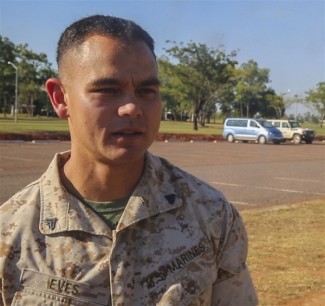 PHOTO: Marine Corps Cpl. Christopher Eves was formerly an officer in the Australian army. Eves served for six years before coming to the United States to join the Marine Corps and is now serving in his native land with Marine Rotational Force Darwin. U.S. Marine Corps photo by Cpl. James Gulliver ROBERTSON BARRACKS, Australia – Marine Corps Cpl. Christopher Eves, born in Queensland, Australia, is back in his native land, serving as a section leader with Weapons Company, 1st Battalion, 5th Marine Regiment, Marine Rotational Force Darwin. Eves was raised just outside of Brisbane, Australia, though as the son of an Australian soldier, he said, he constantly was moving from place to place. “I could never really call one place home,” he said. “We were always moving around, but the army lifestyle appealed to me.” In 2004, Eves signed up to be an officer in the Australian army. “A lot of my family had been in the army,” he said. “There was a lot of action going on at the time, so I wanted to get out and see the world.” Eves worked with multiple U.S. military services, he said, but he first encountered U.S. Marines while participating in Operation Iraqi Freedom. “They just had a similar attitude to the Australian soldiers,” he said. “They always got more done with less support. That’s what I loved about them.” The Marines trained harder than everyone, they worked harder and they were the most professional, Eves added.
PHOTO: Marine Corps Cpl. Christopher Eves was formerly an officer in the Australian army. Eves served for six years before coming to the United States to join the Marine Corps and is now serving in his native land with Marine Rotational Force Darwin. U.S. Marine Corps photo by Cpl. James Gulliver ROBERTSON BARRACKS, Australia – Marine Corps Cpl. Christopher Eves, born in Queensland, Australia, is back in his native land, serving as a section leader with Weapons Company, 1st Battalion, 5th Marine Regiment, Marine Rotational Force Darwin. Eves was raised just outside of Brisbane, Australia, though as the son of an Australian soldier, he said, he constantly was moving from place to place. “I could never really call one place home,” he said. “We were always moving around, but the army lifestyle appealed to me.” In 2004, Eves signed up to be an officer in the Australian army. “A lot of my family had been in the army,” he said. “There was a lot of action going on at the time, so I wanted to get out and see the world.” Eves worked with multiple U.S. military services, he said, but he first encountered U.S. Marines while participating in Operation Iraqi Freedom. “They just had a similar attitude to the Australian soldiers,” he said. “They always got more done with less support. That’s what I loved about them.” The Marines trained harder than everyone, they worked harder and they were the most professional, Eves added.
After six years in the Australian army, Eves said, he decided it was time to make his dream of being a Marine a reality. He and his wife moved to Virginia, where he enlisted into the Marine Corps. His leadership experience made the trials of boot camp much easier than they might have been for others, he said. “He’s just one of those guys who is a born a leader,” said Marine Corps Cpl. Cameron Flavel, a squad leader with Weapons Company. “I remember one time in boot camp they had him teaching a land navigation class, because he knew more than the instructors.” Eves said he was used to the trials of a military lifestyle, making the adjustment that most new Marines have to go through much easier. “Everything just came natural to me,” he added. “I already had a lot of experience, so I loved sharing it and helping out the other Marines.” During his initial deployment to Okinawa, Eves was able to teach his Marines everything from jungle warfare to patrolling. “I was only a lance corporal at the time, teaching classes that a staff sergeant should be teaching, just because of my prior experience,” he said.
Read more: Meet Your Military: Former Australian Soldier Returns as U.S. Marine





